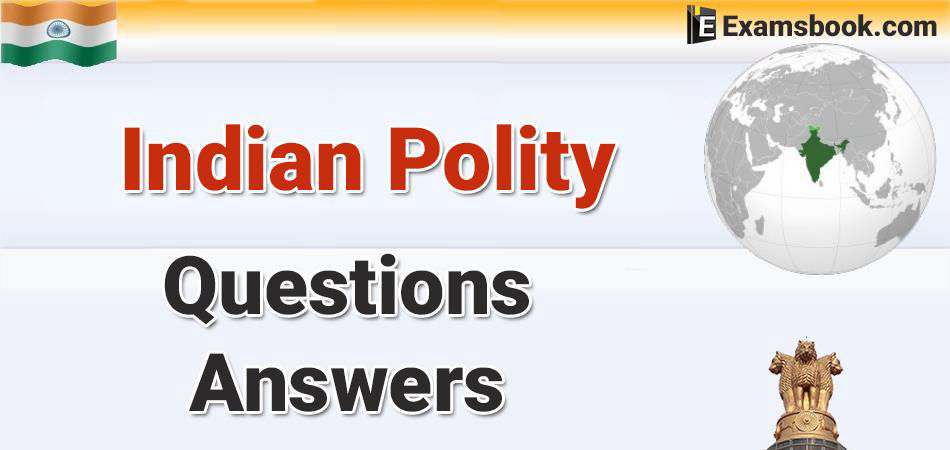Indian Polity Questions for Competitive Exam

Indian Polity Questions for competitive examination for better results. Take Indian Polity Questions and Answers from various political categories and increase your knowledge instantly. The Indian Polity questions will give you a fair idea about which section you need to focus more on in the upcoming examinations. The provided Indian Polity Questions had already been asked in different competitive exams.
Indian Polity Questions
In this section, I am providing all types of Indian Polity Questions related to General Knowledge, By visiting here, you can read Indian Polity General Knowledge Questions for your better performance in competitive exams.
Also, Read Latest Current Affairs Questions 2022: Current Affairs Today
Students can quickly get free General Knowledge Mock Test and Current Affairs Mock Test on this platform for online exam practice to obtain good marks in competitive exams.
Polity GK Quiz Questions
Q : Amnesty International Organization volunteers campaign for :
(A) Human rights all over the world
(B) Human values worldwide
(C) Human evolution studies
(D) Human free education rights
Correct Answer : A
Explanation :
The correct answer is human rights all over the world. Amnesty International Organization volunteers campaign for Human rights all over the world.
Who was the first president of the Indian National Congress?
(A) WC Banerjee
(B) Motilal Nehru
(C) Ballabhbhai Patel C
(D) None of these
Correct Answer : A
Explanation :
1. The first President of the Indian National Congress was Vyomesh Chandra Banerjee. He was a Bengali lawyer and social worker.
2. He presided over the first session of the Congress held in Bombay in 1885.
3. Vyomesh Chandra Banerjee was born in Calcutta in 1844. He obtained a law degree from Calcutta University and worked as a lawyer.
The Act enabled the Governor General to associate representatives of the Indian People with the work of legislation by nominating them to his expanded council ?
(A) Government of India Act, 1858
(B) Government Act of India Act, 1861
(C) Government of India Act, 1892
(D) Government of India Act, 1915
Correct Answer : B
Explanation :
The Government of India Act, 1861 was an act of the Parliament of the United Kingdom which consolidated the earlier acts relating to British India into a single Act.
The parliamentary committee to review the report of the Comptroller and Auditor General of India is?
(A) Assessment Committee
(B) Public Accounts Committee
(C) Select Committee
(D) None of these
Correct Answer : B
Explanation :
The function of the Public Accounts Committee is to examine the annual audit reports of the Comptroller and Auditor General of India (CAG), which are laid before the Parliament by the President.
Before the independence of India, Dadra and Nagar Haveli were under the administrative control of?
(A) English
(B) French
(C) Portuguese
(D) Afgans
Correct Answer : C
Explanation :
Dadra and Nagar Haveli were small undefended Portuguese overseas territories, part of Portuguese India since 1779. The territories were enclaves, without any access to the sea, administered by the Portuguese Governor of the district of Damão.
How are Members of Parliament replaced in case of death and resignation?
(A) Through by-elections
(B) Through general elections
(C) Both
(D) None of the above
Correct Answer : A
Explanation :
The President of India names an individual as the Prime Minister who is either the head of the gathering which holds a majority share of seats in the Lok Sabha or is an individual who can win the certainty of the Lok Sabha by picking up the help of other ideological groups. Any remaining ministers are named by the President on the counsel of the Prime Minister.
In which of the following the presidential (presidential) government is formed?
(A) Fixed term of office
(B) No duplication of the executive among the members of the legislature
(C) Election of the President by popular vote
(D) all of the above
Correct Answer : D
Explanation :
The United States, for instance, has a presidential system.
Which provision of the Constitution empowers the Central Government to provide reservations for the weaker section of society in jobs and educational institutions?
(A) Article 14
(B) Article 16
(C) Article 46
(D) Article 19
Correct Answer : B
Explanation :
The Constitution was amended by the Constitution (77th Amendment) Act, 1995 and a new clause (4A) was inserted in Article 16 to enable the government to provide reservation in promotion.
Statement (1) Civics as a subject in the Indian school curriculum was the result of the imperial policy of the British Government.
Statement (II): Civics was introduced in view of the increasing disloyalty among Indians towards the British Raj.
(A) Only statement (I) is correct
(B) Only statement (II) is correct
(C) Both statements are correct and statement (II) is the correct explanation of ( 1 )
(D) Both statements are incorrect.
Correct Answer : B
Explanation :
Political science is the social science that deals with politics, government, and the system of governance. the civics deals with the aspects and needs of the citizen, whereas the political science with the governance, so by changing the nomenclature wants to bring both the aspects together to form better citizens.
The Central Government has started the process of making how many airbags mandatory from 01 October 2022?
(A) 6
(B) 10
(C) 12
(D) 8
Correct Answer : A
Explanation :
6 Airbags Mandatory in Cars from 1st October 2023. The road transport ministry was set to make 6 airbags mandatory in all 8-seater passenger vehicles starting 1st October 2022. However, it could not be implemented due to supply chain disruptions in the global automobile manufacturing sector.



